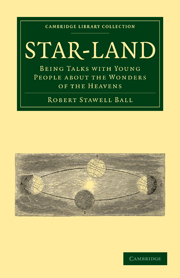LECTURE II - THE MOON
Published online by Cambridge University Press: 01 June 2011
Summary
THE PHASES OF OUR ATTENDANT THE MOON
The first day of the week is related to the greatest body in the heavens—the sun—and accordingly we call that day Sun-day. The second day of the week is similarly called after the next most important celestial body—the moon—and though we do not actually say Moon-day, we do say Monday, which is very nearly the same. In French, too, we have lune for moon, and Lundi signifies our Monday. The other days of the week also have names derived from the heavens, but of these we shall speak here after. We are now going to talk about the moon.
We can divide the objects in this room into two classes. There are the bright faces in front of me, and there are the bright electric lights above. The electric lights give light, and the faces receive it. I can see both lights and faces; but I see the lights by the light which they themselves give. I see the faces by the illumination which they have received from the electric lights. This is a very simple distinction, but it is a very important one in Star-land. Among all these bodies which glitter in the heavens there are some which shine by their own light like the lamps. There are others only brilliant by reflected light like the faces.
- Type
- Chapter
- Information
- Star-LandBeing Talks with Young People about the Wonders of the Heavens, pp. 70 - 125Publisher: Cambridge University PressPrint publication year: 2010First published in: 1889



